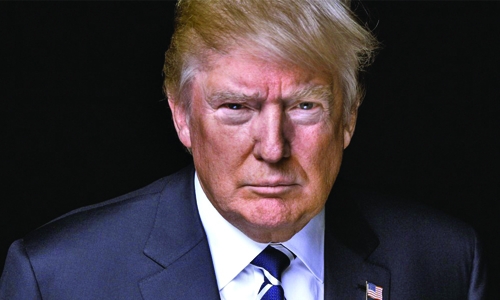Trump defiant after criticism of aluminium & steel tariffs
Washington : U.S. President Donald Trump struck a defiant tone yesterday, saying trade wars were good and easy to win, after his plan to put tariffs on imports of steel and aluminium triggered global criticism and a slide in world stock markets.
The European Union raised the possibility of taking countermeasures, France said the duties would be unacceptable and China urged Trump to show restraint. Canada, the biggest supplier of steel and aluminium to the United States, said it would retaliate if hit by U.S. tariffs.
U.S. stocks opened sharply lower on Friday as investors fretted about a potential global trade war.
Trump said on Thursday that a plan for tariffs of 25 percent on steel imports and 10 percent on aluminium products were designed to safeguard American jobs in the face of cheaper foreign products and would be formally announced next week.
“When a country (USA) is losing many billions of dollars on trade with virtually every country it does business with, trade wars are good, and easy to win,” Trump tweeted on Friday.
“Example, when we are down $100 billion with a certain country and they get cute, don’t trade anymore-we win big. It’s easy!” he wrote. It was not clear which country he was referring to.
The prospect of retaliation from Canada, China and Europe sent world stocks tumbling towards a 2.5 percent weekly loss as investors turned to traditional safe havens such as government bonds, gold and the Japanese yen.
ArcelorMittal SA, the world’s biggest steelmaker, slumped nearly 5 percent and shares in automakers such as Fiat Chrysler suffered on concerns U.S. tariffs could increase the cost of key materials used in cars.
“It is a real worry because Europe is an open global economy so it isn’t just about U.S. versus China,” said Ian Ormiston, European equity fund manager at Old Mutual Global Investors.“And we will see retaliation, there are no two ways about it.”
Trump believes the tariffs will protect American jobs but many economists say price increases for consumers of steel and aluminium, such as the auto and oil industries, will destroy more jobs than they create.
Home appliance maker Electrolux said it was delaying a $250 million expansion of its plant in Tennessee as it was worried U.S. steel prices would rise and make manufacturing there less competitive.
But Turkey’s leading steelmaker Borusan Holding said it might expand its U.S. steel pipe factory in Texas because of the proposed tariffs.
EU SAFEGUARD MEASURES
The European Commission, the EU’s executive, called the U.S. tariffs a blatant intervention that amounted to protectionism and promised to act“firmly” in response.
The EU, which sees itself as a global counterweight to a protectionist-leaning Trump, made no mention of retaliation but spoke of countermeasures that conform with World Trade Organization (WTO) rules.
“We see international trade relations as a win-win situation,” a European Commission spokesman said.
“We don’t see this as a situation where, like in a zero-sum game, one party loses because another party wins. Trade is beneficial for everyone. It needs to take place on the basis of rules and these rules are in place.”
Safeguard measures, last deployed by Europe in 2002 after then U.S. President George W. Bush imposed steel import duties, would be designed to guard against steel and aluminium being diverted to Europe from elsewhere if U.S. tariffs come in.
Related Posts

